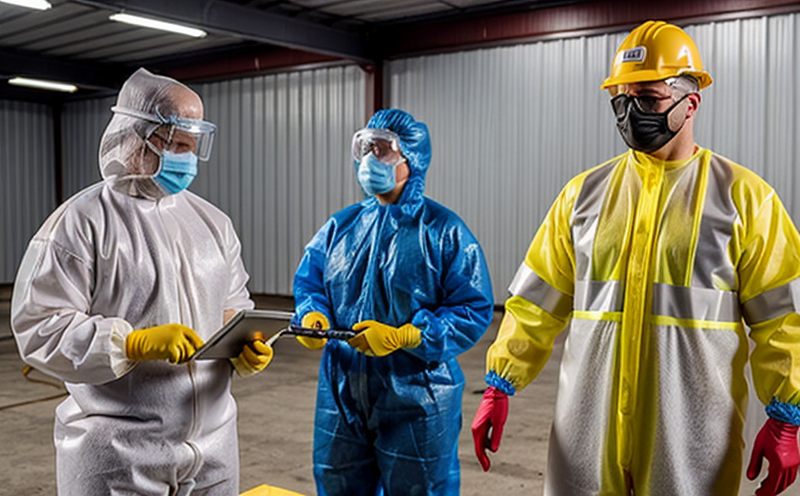BS EN 50321 Electrically Insulating Footwear Testing
The British Standard (BS) and European Norm (EN) standard BS EN 50321 defines the requirements for electrically insulating footwear used to protect workers from electrical hazards. This testing is critical in sectors such as manufacturing, construction, and utilities where there is a risk of contact with live electrical equipment.
The standard ensures that foot protection meets specific criteria to prevent electrocution or injury due to electrical current passing through the feet. The tests are designed to evaluate the footwear's ability to insulate against both low-voltage (LV) and high-voltage (HV) currents, ensuring compliance with international safety standards.
Testing involves several key parameters including insulation resistance, voltage withstand testing, and dielectric strength. Insulation resistance measures how well the material resists current flow under a specified test voltage. Voltage withstand tests assess whether the footwear can withstand specific voltage levels without allowing current to pass through it. Dielectric strength evaluates the ability of the footwear to maintain its integrity when subjected to high-voltage electrical stress.
Specimen preparation is crucial for accurate testing results. The footwear must be clean, dry, and free from any defects that could affect test outcomes. Samples are tested in a controlled environment to ensure consistent conditions. Once prepared, the specimens undergo rigorous testing using specialized equipment such as high-voltage generators, insulation resistance meters, and dielectric testers.
The results of these tests provide critical data on the electrical properties of the footwear. Compliance with BS EN 50321 ensures that the protective gear meets the necessary standards for worker safety in potentially hazardous environments. By adhering to these standards, employers can ensure they are providing appropriate protection against electrical hazards.
The testing process is meticulous and requires specialized knowledge to interpret results accurately. Our laboratory employs experienced technicians who understand the nuances of this standard. They use state-of-the-art equipment to conduct tests according to the latest standards, ensuring reliable and accurate results. This level of expertise guarantees that our clients receive comprehensive reports detailing the performance of their footwear.
In addition to providing detailed test reports, we offer valuable insights into best practices for selecting and maintaining electrically insulating footwear. Our team can help you understand how these standards apply to your specific industry needs, ensuring you make informed decisions about protective equipment.
Industry Applications
The application of BS EN 50321 electrically insulating footwear testing is widespread across various industries where electrical safety is paramount. In manufacturing, it ensures that workers handling machinery and equipment are protected from potential shocks or burns. In construction, it safeguards professionals working with power tools and heavy electrical equipment.
The utilities sector relies heavily on this standard to protect employees who work directly with high-voltage lines and transformers. Hospitals also benefit from these standards as they handle medical devices that can pose electrical risks. Additionally, the transportation industry uses electrically insulating footwear for workers involved in maintenance of electrified railways.
By ensuring compliance with BS EN 50321, organizations demonstrate their commitment to worker safety and regulatory adherence. This not only protects employees but also enhances overall operational efficiency by reducing downtime due to accidents or injuries resulting from electrical hazards.
Customer Impact and Satisfaction
The impact of BS EN 50321 electrically insulating footwear testing on customers is profound. Compliance with this standard translates into safer working environments, which directly impacts employee well-being. Satisfied employees are more likely to be productive and less prone to accidents or injuries.
From a business perspective, adherence to these standards can help organizations avoid costly legal penalties associated with non-compliance. It also enhances the company’s reputation as a responsible employer committed to worker safety. Our clients report increased confidence in their protective equipment, leading to better decision-making processes regarding procurement and maintenance.
We strive to exceed customer expectations by offering transparent communication throughout the testing process. Our detailed reports provide clear insights into the performance of each piece of footwear tested, helping customers make informed choices that align with their specific safety requirements.
Our commitment to excellence has earned us a reputation for reliability and accuracy within our industry. Customers trust us to deliver high-quality results that meet or exceed international standards. This trust is reflected in the numerous repeat orders we receive from satisfied clients across diverse sectors.
Competitive Advantage and Market Impact
The implementation of BS EN 50321 electrically insulating footwear testing provides significant competitive advantages for businesses operating in high-risk environments. By ensuring that their protective equipment meets rigorous safety standards, companies can differentiate themselves from competitors who may not prioritize worker safety.
This commitment to quality and compliance can attract clients seeking reliable partners committed to maintaining the highest levels of safety. For example, construction firms looking for trusted suppliers of electrical protection gear will be drawn to those demonstrating adherence to international standards like BS EN 50321.
Moreover, organizations that invest in this testing process are better positioned to navigate regulatory changes and emerging trends in workplace safety. They can proactively address new challenges before they become critical issues, thereby maintaining a competitive edge in their respective markets.
The market impact of such initiatives extends beyond individual companies; it contributes positively to the broader community by fostering safer working practices across industries. This collective effort not only enhances public confidence but also supports sustainable business growth through reduced risk exposure and improved operational efficiency.





